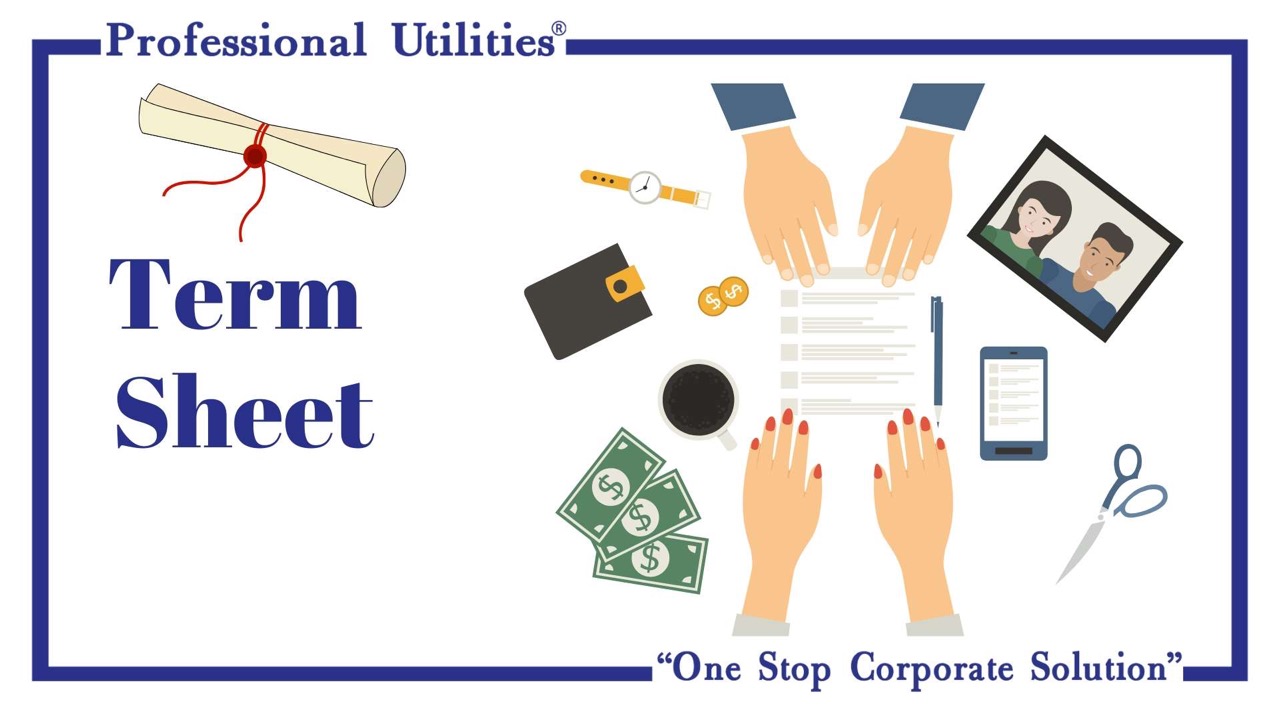
A startup founder’s aim is to impress potential investors through his knowledge, competency, and business model. One collective challenge founders face is the understanding of Term Sheets along with the numerous and potentially confusing terms it can contain. In the context of Startup Funding, a Term Sheet is a non-binding document that outlines the offered terms and conditions under which an investment will be made by an “Angel” or a Venture Capital investor. It lays out the terms of financing and collateral.
A Term Sheet is provided during a meeting with investors and states the guidelines on how both parties will be acting to safeguard the investments. In the context of Indian startup funding, it sets out the broad parameters for potential investment, thus creating a framework for negotiation on the final agreement. However, a Term Sheet is not binding on an investor to invest in the company, and likewise on the company seeking investment.
Salient Features of a Term Sheet
- Term Sheet is a written document presented in bullet-point format.
- Its nature is non-binding.
- The Term Sheet is subject to modifications whenever needed
- It is prepared before the final agreement to be ready for a business deal.
- It acts as a reference point while preparing the final document.
- It is a template which helps prepare a more detailed and legally binding document.
What entails a Term Sheet for a startup?
The two primary issues covered in the Term Sheet are:
1. Economics of investment: matters relating to the funding and liquidation of the startup.
2. Control of the company: This includes the issues about the corporate governance of the startup.
Understanding the Investor Term Sheet
It is essential to understand the technicalities of a Term Sheet and the terms associated with it. Let’s look at some such crucial terms related to a Term Sheet:
- The issuer of the Term Sheet: The VCs or Angel investors most likely issue a Term Sheet. In the context of startup funding India, for a more diverse group of investors, it will be issued by the company to coordinate the fund-raising activity. The company issues the Term Sheet for funding rounds with multiple investors.
- Securities or the type of Equity: The kind of security can be equity, preferred shares, or warrants. The point to be noted is that in the case of venture capital, it will also define the round the company is raising like the family/friends or angel round, seed round or a Series A, B, C or D round.
- Pre-money valuation: The company’s worth before the infusion of investment decides the number of shares the investor would get upon investing in the company. The valuation reached, by the addressable market, the traction generated by the company and the company’s future revenue projections.
- Post-money valuation: The post-money valuation is the worth of the company after investment, which means it is the pre-money valuation plus the money that has been invested. The post-money valuation for a particular round becomes the pre-money valuation for the next round unless some significant event like a substantial increase in traction affects the valuation process.
- Number of shares: The shares given to the investors constitute the number of shares issued, and provide investors with rights, proportionate to the amount of money invested by them. The price per share is also calculated based on the number of shares.
- Conversion: Investors who receive preferred stocks, or higher class than common stock get conversion rights.
- Price per share: The price per share determines the price investors are liable to pay per ownership share in the company.
- Dividends: Dividends outline the rights of the investors to the dividend payout by the company and determine who gets priority when divided is issued.
- Liquidation preference: This involves the investors’ exit policy in case there is a liquidation of the company due to sale, lease, licensing or transfer of company’s assets to some other equity or disposal of the company’s assets in case of bankruptcy.
Advantages of Term Sheet
It is not mandatory to make a Term Sheet; however, preparing it proves to be highly advantageous to both the parties entering a business deal. Let’s look at some of the advantages of a Term Sheet:
- Term Sheet outlines the intention of parties to agree to acquisition, funding, or financial agreement.
- It creates an elementary relationship among investors, startups, venture capital providers, and other firms.
- Further negotiations can be done to make modifications in the Term Sheet before the final agreement is prepared.
- It reduces the time taken for negotiation on a business agreement.
- It eliminates the chances of a misunderstanding and considerably reduces the probability of occurrence of unnecessary details.
- It saves the cost of parties by ensuring that expensive legal charges involved in the drawing of an agreement are not undertaken prematurely.
- It provides the freedom to both parties to walk out of the agreement without tainting their image if it is not executed as promised.
Why Professional Utilities?
At Professional Utilities, we leverage our industry knowledge and expertise to help businesses navigate complex regulations, minimize risks, and optimize operations for maximum efficiency and profitability.

One Stop Corporate Solution

PAN India
Services

Free Expert
Assistance

Google Verified
Business

Dedicated Support
Staff


.svg)







